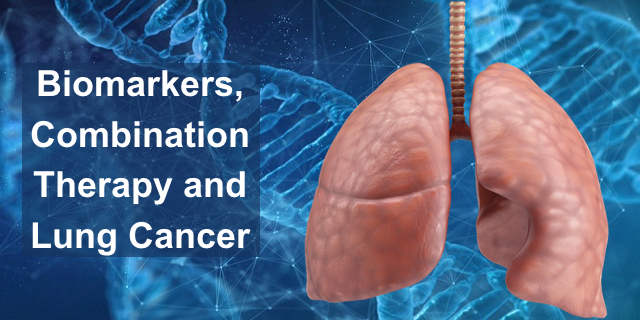KRAS, one gene present in some cancers, was considered “undruggable” for years.[1] Mutated KRAS is an important target for patients with non-small cell lung cancer (NSCLC) because it’s present in 20-25% of cases.[2] Finally, one drug, sotorasib (Lumakras), is approved to treat one mutant form of KRAS gene, KRAS G12C.[3] This mutation appears in about 33% of all lung adenocarcinoma patients.[4]
Patients with KRAS G12C might take sotorasib after initial chemotherapy and immunotherapy stop working. A new study [4] suggests improved success by giving a KRAS G12C inhibitor along with another targeted immunotherapy drug instead of sequentially. This encouraging news may lead to a combined drug therapy for KRAS G12C-positive lung cancer patients.
New Study Findings
The researchers note that KRAS G12C suppresses immunity in a tumor’s “microenvironment.” Perhaps combining a KRAS inhibitor with immunotherapy drugs could improve immune system response. That is, suppressing KRAS G12C improves the immune system, so this would be a window of opportunity to use other immunotherapies to boost it further. This contrasts with the current treatment, giving sotorasib only after other therapies stop working.
Researchers in this study combined a KRAS G12C inhibitor called MTRX1257 with different immunotherapies in lung cancer mouse models. This combination therapy was effective, but only in a particular subset of lung cancer tumors: Those that respond to immune checkpoint blockade (ICB) medications. As Dr. Miriam Marina-Arcas, one of the study authors, says, [5]
In our study, we show that although the positive changes in the immune tumor microenvironment are observed in different models, only those tumors called “immune hot” (tumors that have active immune cells and have some response to immune checkpoint blockade) will benefit from the combination of KRAS G12C inhibitors with immunotherapies.
However, studies continue. Another anti-KRAS G12C drug showing promise, adagrasib, filed for FDA approval. The supporting clinical study finds that nearly 43% of patients with NSCLC having that specific mutation respond to the proposed drug. Adagrasib also acted against lesions in the brain from metastasized NSCLC.
Future studies
Mouse models only provide limited data, but the data is encouraging. Future studies of many kinds, including human clinical trials, need to find drugs that stimulate the immune system to eliminate the cancer cells that resist the KRAS G12C inhibitors. Studies also need to find drugs to help patients who do not have KRAS G12C.
Get Tested
The American Lung Association calls biomarker testing an “important part of your treatment journey” for anyone with lung cancer. (Here’s a link to their information on biomarker testing.) Biomarker testing, such as Next Generation Sequencing (NGS), examines the tumor tissue for certain mutant genes, such as one called PD-L1. A high presence of PD-L1 indicates that you may have mutations that can be targeted by immunotherapy. Looking for mutated PD-L1 is a place to start.
Footnotes:
[2]https://www.youtube.com/watch?v=c4i5xAXqJZg
[3]https://pubmed.ncbi.nlm.nih.gov/34903582/
[4]https://www.science.org/doi/10.1126/sciadv.abm8780
Image credits:
Victoria_Borodinova from Pixabay
Eksavang Khounphinith from Pixabay






